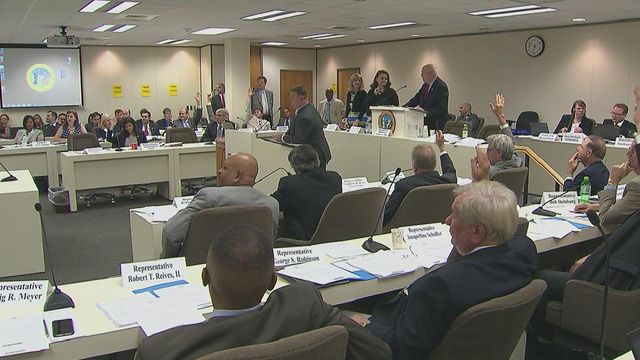Finance committee expands medical tax deduction in state budget
Members of the House Finance Committee battled over several money-raising provisions in the state budget Monday night. The bill escaped the committee on a 19-16 vote after much back and forth.
Posted — UpdatedAlthough votes in the committee weren't recorded, it appears Republican leaders saw several of their more conservative members go against them on the vote to send the bill onto the House Appropriations Committee.
Blust also pointed to provisions that raised virtually all Division of Motor Vehicles fees by 50 percent, raising the cost of driver's licenses, titles and the like. The fee for an eight-year driver's license renewal, for example, moves from $32 to $48.
"Before your pour more money into a leaking bucket, I want to fix the bucket," Blust said of the Department of Transportation. "I remember when there was a Republican Party in the House."
Also voting against the budget bill were two former Finance Committee chairmen, Reps. Julia Howard, R-Davie, and Mitch Setzer, R-Catawba.
"I have a lot of heartburn over these DMV fees," Setzer said when asked about his vote.
A small group of centrist Democrats who have been working under the banner of Main Street Democrats helped buoy the bill, setting up the intriguing possibility that the measure could pass later this week even if it loses a large chunk of conservative members on the floor.
Asked if the measure was at all in trouble, Rep. Nelson Dollar, R-Wake, brushed off any concerns about a closer-than-expected vote, saying, "I think we'll be in good shape as this bill goes forward."
Now clear of the Finance Committee, House Bill 97 heads to the full Appropriations Committee, where it is expected to be the subject of a full-day debate and amendment session. It will then go to the House floor later this week. It should be in the Senate's hands by Memorial Day, where lawmakers will draft their own version of the bill. Those two versions will then be reconciled.
Expanding health deductions
Some of the tussles came over minor amendments, such as a change offered by Setzer, R-Catawba, that deleted a requirement that small, nonprofit agricultural fairs collect sales taxes. A similar bill died on the House floor during the last legislative session but picked up enough support to pass without a full show of hands in committee.
The most notable amendment may have come from Howard, who offered a change to the bill that would expand a tax deduction for medical expenses to all taxpayers. The loss of that deduction sparked a flood of complaints to members' offices.
As it was initially drafted, the budget bill would have restored the deduction to anyone over age 65.
"If we're going to allow it, we should allow it for everyone," Rep. Bert Jones, R-Rockingham, said.
But Rep. Paul "Skip" Stam, R-Wake, pointed out that the expansion would cost $30 million a year, money that would would have to taken away from spending on education or health care.
"Money is money," Stam said. "If you spend it here, you can't spend it somewhere else."
He also argued that the move would unravel the tax reform measure of 2013, which generally sought to close loopholes and lower rates for everyone. The argument was particularly pointed because it is one that Howard herself had used to push back against tax changes the year before.
Still, the amendment was incorporated into the bill on a voice vote.
Renewable energy tweaks fail
There was a prolonged kerfuffle over two amendments aimed at tweaking state credits for renewable energy.
The first, offered by Rep. Mike Hager, R-Rutherford, would have extended tax credits for one year but not have included the solar industry, which is already the subject of a safe harbor agreement.
"Knowing your past support of solar and renewables," Rep. Jason Saine, R-Lincoln, joked, "I just want to be assured that, if we pass your amendment, we're supporting those renewable industries."
Hager said that the committee would be, but the measure failed on a 14-21 vote.
Rep. Charles Jeter, R-Mecklenburg, put forward another version of the amendment that he said would be a "clean" extension of the renewable energy credits, but it also met with skepticism. Rep. Bob Steinburg, R-Chowan, for example, raised the possibility that it would possibly harm wind energy projects near the coast.
The Jeter amendment also failed.
Democratic efforts turned back
Several amendments offered by mainly liberal Democrats were turned back by the committee. For example, an effort by Rep. Paul Luebke, D-Durham, to reinstate the earned income tax credit, which would pay the average recipient about $100 per year, was roundly criticized by Republican leaders.
Rep. David Lewis, R-Harnett, said lower-income people get more benefit from the fact that their first $15,000 of income is tax exempt.
Rep. Becky Carney, D-Mecklenburg, offered up a measure that would have exempted mortgage debt forgiven by banks from income tax. She said it made little sense to heavily tax people who were having trouble repaying their loans, but Republicans argued that forgiven debt it typically treated as income.
An amendment by Rep. Kelly Alexander, D-Mecklenburg, would have applied the same 3 percent sales tax on automobiles to boats and private planes, which are both now capped at $1,500.
That drew objections from coastal lawmakers, who said a similar tax raised in the 1970s sent boat builders fleeing from North Carolina. Steinburg said that the recession had hit boat builders particularly hard and that they were just now recovering.
"I don't want to go back to where were just a few years ago," he said.
Related Topics
• Credits
Copyright 2024 by Capitol Broadcasting Company. All rights reserved. This material may not be published, broadcast, rewritten or redistributed.






